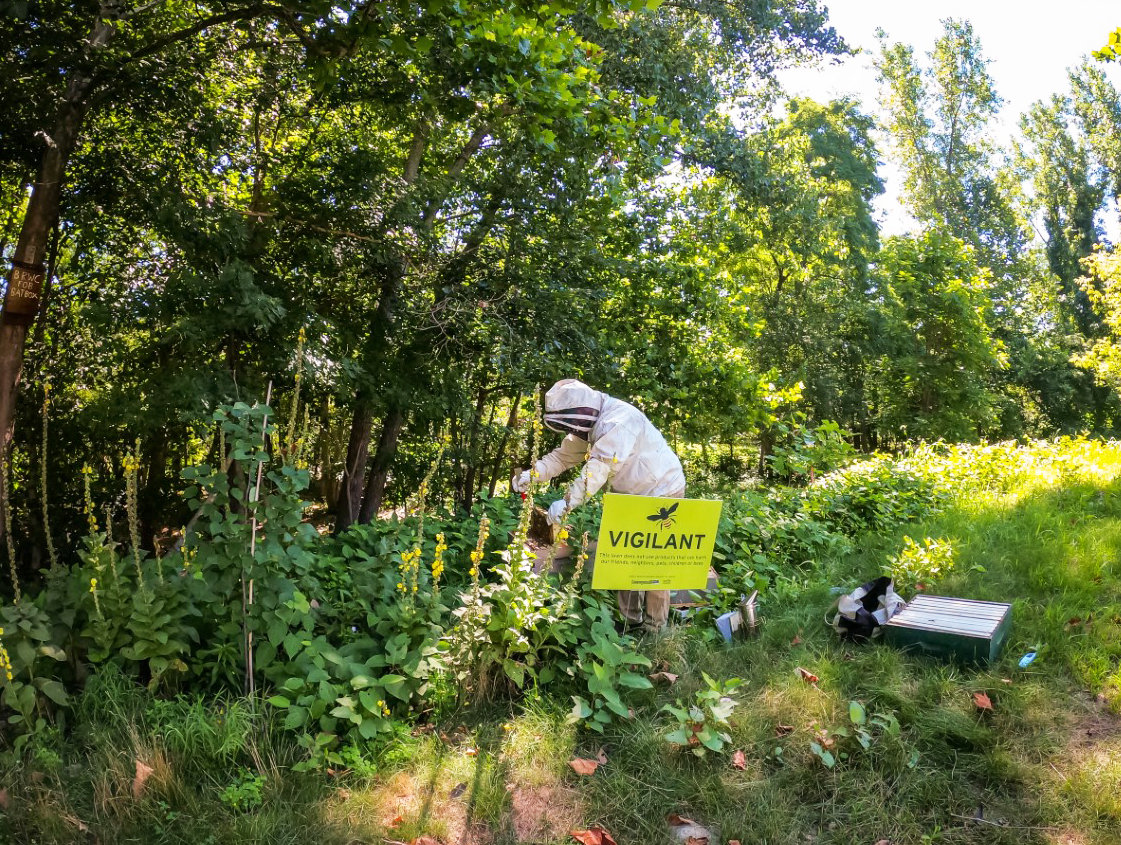Still, we persist
A message on a lawn sign provides hope and a rebirth of wonder in a dark time
PROVIDENCE – With the coronavirus pandemic in full bloom across the U.S., many folks, as part of practicing social distancing, wearing a mask, and being vigorous about personal hygiene, have returned to gardening as a form of personal rewarding activity that can be done at home, not online, without a team – save for the veritable army of pollinators that plants depend on to thrive.
Four years ago, following a conversation that began when we were both guests on “Executive Suite” hosted by WPRI’s Ted Nesi, Joanna Detz, the publisher of ecoRi News, discussed ways in which we could find paths to collaborate as two digital news platforms in Rhode Island.
The first project we launched together was “Bee Vigilant,” a public education campaign targeted at consumer awareness, to produce lawn signs that proclaimed: “This lawn does not use products that can harm our friends, neighbors, pets, children or bees.”
The bold vision was that these signs would some day replace the ubiquitous flags on many lawns that warned folks that the grass had been treated with dangerous chemicals.
To support that effort, Frank Carini, the editor of ecoRI News, and I, collaborated on writing a series of stories to promote the practice of safer gardening practices. The first was entitled, “Will you bee vigilant?’ [See link below to ConvergenceRI story.]
The initial story, published on April 11, 2016, ended with a tone of positive optimism: “Bee Vigilant offers a way for consumers to show their true colors, to take immediate, effective and positive action at the individual consumer level. The marketplace sometimes does listen to and respond to consumers’ voice; there’s a reason why the market for organic products grew a phenomenal 11 percent last year.”
True north
Taking personal responsibility for our actions and activities, particularly during a time when the coronavirus has disrupted so much of our lives, with its exponential rise in cases in the U.S., which has claimed an astounding 165,431 deaths in the last six months, with more than 5.1 million confirmed cases and counting, can be a daunting, humbling experience.
Taking personal actions in our own lives can made be made even more difficult with the knowledge that the coronavirus pandemic presages future calamities far worse from climate change and the our perverse relationship with the fossil fuel industry.
Still, there is something magical about allowing ourselves to be both diligent and observant in finding solace in the natural world around us: the butterflies, dragonflies and hummingbirds that are regular visitors to our gardens.
For me, I often find my compass from a pair of visiting osprey who nest in Hundred Acre Cove in Barrington, returning in late March and departing in late August, after hatching their offspring, a natural clock that operates according to the amount of light in the sky, oblivious to breaking news from news sources or online proposals for new products that I do not need.
A shot in the arm
The most important possession we have is our own personal stories, and sharing them, engaging in conversations, is what makes us human. Still, we persist.
It was a pleasant surprise, then to receive an email from Chris Barnett, the communications guru for the Rhode Island Foundation, in which he shared a photograph taken of the pollinator garden in Lincoln, where the “Bee Vigilant” lawn sign was proudly displayed.
Chris wrote: “Thought you’d get a kick out of seeing this photo from the Blackstone River Watershed Council’s pollinator garden in Lincoln. The sign recognizes ConvergenceRI as a sponsor. Hang in there.”
Indeed, we all need to hang in there, and take heart in the ways that we can change the world in small ways, in our own lives, one lawn sign at a time.






